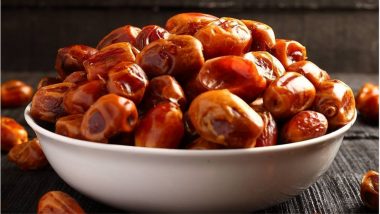Ramadan or also called Ramzan is the holiest month for the Muslim community. Muslims around the world observe fast for 29 to 30 days based on the visual sightings of the crescent moon. Muslims begin their fast by eating sehri or suhoor, a pre-dawn meal consumed by Muslims before the prayer. And post sunset, they break their fast by eating dates that is a popular Islamic tradition. It is more than just a tradition, dates have a lot of health benefits.
The tradition of breaking the fast with dates is rooted in the Prophet Muhammad’s teachings, who said, “When one of you is fasting, he should break his fast with dates; but if he cannot get any then with water, for water is purifying.” Dates make for an ideal and healthy choice for fuelling an empty body. It contains glucose, fructose and sucrose as well as fibre, potassium and vitamin A. They are also effective in restoring energy after a day-long fasting as they contain small amounts protein and fat. Consuming dates after a long day of fasting can help the body’s glucose levels to return normal quickly.
As reported in Jakarta Post, Rita Ramayulis from Indonesian Nutritionists Association says, “Wet or dry dates are as good. The combination of sucrose, glucose and fructose can increase blood sugar levels and stabilise them at the same time.” Iron contained in dates can promote healthy teeth and be beneficial for people who suffer from iron deficiency.
Whether it is the month of Ramadan or not, eating dates is highly recommended to include in your daily diet. Ramadan is a month where Muslims practice self-discipline, engage in day-long fasts and chant prayers from Quran, the holy book of Islam. Ramadan 2018 began on May 15 and will end on June 14. While the holy month is still on, we wish you a very Happy Ramadan 2018!
(The above story first appeared on LatestLY on May 21, 2018 10:00 PM IST. For more news and updates on politics, world, sports, entertainment and lifestyle, log on to our website latestly.com).













 Quickly
Quickly





















